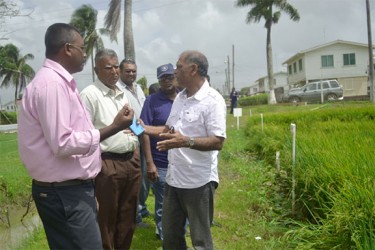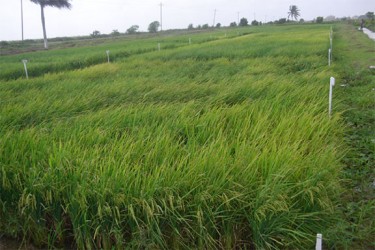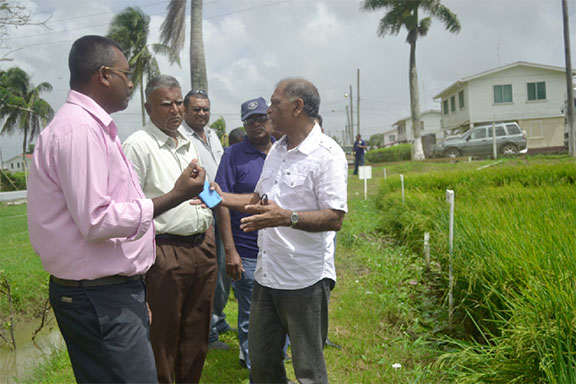The Guyana Rice Deve-lopment Board (GRDB) is expected to release new varieties of rice soon and continues to work on others such as salt-tolerant rice plants.
On Wednesday, Agriculture Minister Dr Leslie Ramsammy visited the Burma Rice Research Station to check on progress made and for a hands-on approach to some of the techniques used by the scientists, the ministry said in a statement. “While touring the facility, scientist Dr Mahendra Singh explained some of the test done on the F4, F6 and F8 (salt resistant) and the new line of varieties which (are) expected to be released shortly targeting 20 farmers in the initial stage,” the ministry reported.
“Over the years, we (scientists) at the Research Station have been working to ensure that we don’t only release new and improved varieties of rice but also varieties which can withstand heavy climatic conditions and still produce exceptionally well,” Singh was quoted as saying.
 GRDB 11 and 12 have proven successful in garnering more bags of paddy per acre, while GRDB 9 is known to be more feasible, the ministry noted. Apart from tests being done to have more varieties released, the research station is also working on developing varieties that are resistant to pest and disease as well as having tolerance to lodging and blast resistant.
GRDB 11 and 12 have proven successful in garnering more bags of paddy per acre, while GRDB 9 is known to be more feasible, the ministry noted. Apart from tests being done to have more varieties released, the research station is also working on developing varieties that are resistant to pest and disease as well as having tolerance to lodging and blast resistant.
“The research station has come a long over the years, and their work coupled with investment, and farmers input have seen the industry propelling…it is the hope of the government to continue to work with the research station through GRDB to have the station evolve by incorporating new techniques,” Ramsammy was quoted as saying.

One of the focal issues in agriculture is climate change, and cognizant of its effects, the development of new rice varieties is necessary, the ministry noted. Climate change impacts negatively on the availability, stability, access and utilization of food security and according to Ramsammy the development of rice varieties which are blast resistant and have high milling qualities can be not only beneficial to millers and farmers, but the industry as a whole, the statement said.
“Food security is the most vulnerable and as such, it is important that we (Government) continue to push for the right varieties of rice to be developed; hence the reasons for pushing for climate smart agriculture,” Ramsammy said.
The minister noted that scientists at the Burma Rice Research Station have been instrumental in the past in releasing a new line of rice varieties which have proven not only to enable farmers to harvest more bags of paddy per acre, but can withstand harsh climatic conditions.
GRDB 9, 10 and 11 which were released over the last three years became the star of the industry according to Jagnarine Sookhoo, a rice farmer of Mahaicony Creek. He told the ministry that for the last three years, his yields were over 60 bags per acre.
The ministry noted too that the GRDB has incorporated the use of the six point practice which has proven successful with farmers across the rice growing regions. The six improved crop management practices include date of planting, density, treatment of seeds, weed control, fertilization and water management, the ministry said.









